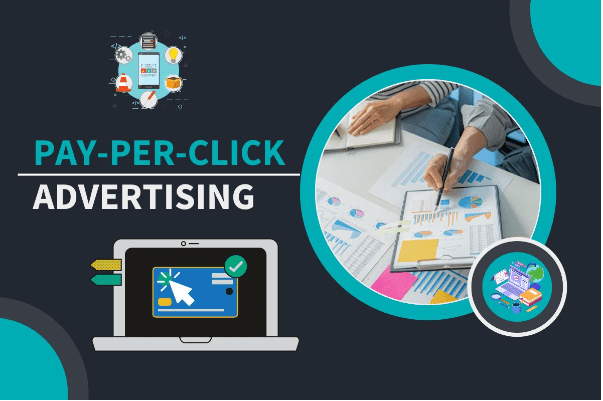PPC stands for pay-per-click, which is a type of online advertising in which advertisers bid on keywords (search terms) in return for search ad space. It’s a way to get free traffic to your site and can be a great form of marketing if used right.
You’re probably familiar with search engines like Google and Yahoo, where people are typing in queries to find information on the internet. These advertisements are most commonly seen at the top of search engine results pages (SERPs) or while scrolling through social media.
For instance, when someone searches for a PPC agency in NJ, that website gets paid for its ad placement by placing an affiliate link on the search results page.
The person who clicks on the link will go to that website and see an ad with a call-to-action that asks them to buy your product or service. The person interested in looking at that website will be motivated enough to look at ads if they’re offered without having to spend a lot upfront.
Just think of how many ad banners you see every day and how many people pass over them without reading them as a whole.
Let’s take a look at how PPC advertising provides benefits for your business.
Benefit #1 – PPC advertising can be tracked and measured.
With Google Ads, a notable advantage of PPC advertising is that it is straightforward to assess and track. Just incorporate the Google Ads tool with Google Analytics.
You are able to view high-level performance data such as conversions (based on the defined business goals) clicks and impressions.
Stats are easily accessible and demonstrate how your campaigns are working in terms of traffic and results for your money.
The concept of attribution of money to direct results is less clear in other advertising and marketing channels.
When you direct PPC traffic to specific landing pages and analyze conversions using Google Analytics, you can see how much you spent and how much it produced in terms of your end goals.
Furthermore, call tracking allows you to isolate your PPC efforts more than SEO and many other marketing activities, as calls can be a major blind spot.
Benefit #2 – You run the show.
Although there are a few nuances to the default campaign settings, you ultimately have control over a wide variety of options for reaching out to potential clients.
Using keywords or locations, you will select the target and the level of restriction you prefer.
For those wanting to start out small, you will have a lot of flexibility with your budget. These can range from setting your own ad budget and bids, to deciding how much you’re willing to spend. However, to play in most cases you will need to pay at least close to a market rate.
If you notice positive results, you can instantly scale up. If you need to take a break, you may simply pause and immediately cease your ad spending.
This is difficult to achieve with other continuing marketing programs, providing you the benefit and budget flexibility to move swiftly when required or wanted.
When compared to competitors, Google Advertising’s auction and the algorithm involved have the final say on where your ads will be positioned and how much you will spend.
Your landing pages need to be relevant to your ad copy and keywords so that they can help you or otherwise hinder you.
The good thing is that you can make quick changes and optimize while your advertisements are running, as well as perform new experiments every day.
There is no extended cycle from edit to deployment as there is in other mediums, and if an ad stinks, you can pull it without having to wait for it to complete a contracted media cycle.
Whether you have a lead quantity objective, a ROAS goal, a spending goal, or other specific goals, you can manage toward and track them using data that is updated every day.
Benefit #3 – PPC advertising complements other marketing channels well.
Most organizations now have content plans and calendars with content marketing taking over the digital marketing industry.
Google Ads is an engine that can drive people to content more rapidly and improve the ROI on your content investment with the investment in developing original and distinctive content to support the consumer buying cycle and establish a thought leadership stance.
PPC and SEO complement each other nicely because impressions and traffic opportunities are frequently directed at the same target – those who use Google to search for information, services, or products.
The performance statistics of Google Ads impressions, clicks, and conversions can provide valuable knowledge and direction for prioritizing SEO efforts on a keyword-by-keyword basis.
Organic traffic performance data and SEO strategy, on the other hand, can also encourage PPC if the data is provided.
All of this contributes to content marketing alignment and ensures that efficiencies are created without separating business end goals.
Remarketing with Google Ads is an excellent way to keep site visitors engaged, regardless of how they arrived at your site. These ads are displayed to users who have already visited and left your website and are based on specific parameters or audiences that you specify.
Fortunately, remarketing can be an excellent place to begin running PPC campaigns. This is because it is less expensive and lower in the funnel than prospecting and brand awareness steps connected to ads.
In other circumstances, PPC can help give data or serve as an alternative to traditional direct marketing initiatives. With expenses per impression and conversion, PPC may also be directly compared to traditional mail.
It can be a significant success if you can shift away from more expensive traditional marketing approaches and toward methods that provide real-time data and improved tracking.
Benefit #4 – Fast and Simple Entry
Even if you’re a decade behind your competition in terms of PPC advertising, with a little bit of optimization, you can be up and running quickly.
Launching SEO campaigns often requires a considerable amount of time to achieve the same results that Google Ads delivers within minutes of launch.
As opposed to other channels such as email and organic social, you have the advantage of targeting those who are not previously familiar with your business.
PPC advertising allows you to instantly cast a wide net in search of new prospects and clients — you’re not limited to just your current followers or customer lists.
Moreover, with PPC advertising, most of the work can be done in the platform, from researching, setting up your campaign and ad writing.
Other than getting assistance for landing pages and setting up conversion tracking, you can get started quickly with minimal input from your development teams.
Benefit #5 – PPC Increases Sales & Traffic to your Website
A well-designed website is excellent, but what good is it if no one knows it exists? PPC benefits include increased traffic to your website.
Your chances of being viewed rise if your paid advertisement appears on the first page of search engine results — PPC advertising can support you in achieving this.
Online shoppers conduct preliminary product research. A consumer who is looking for a specific product or service is more likely to buy.
Your PPC ad is aimed at a specific audience, improving the likelihood of a sale. If online shoppers are pleased with your service, they are more inclined to return.
Using PPC, you can reach a large number of new clients and potential customers.
Key Takeaway
Where traditional forms of advertising may come with a hefty price tag, a Pay per click advert can be scaled depending on your budget.
There are no minimum contract periods required, nor any exclusivity agreements which makes it a very accessible form of PPC advertising for businesses.
We hope that this list of benefits will help you decide why pay-per-click advertising can be beneficial for your business, especially in this digital age.



































